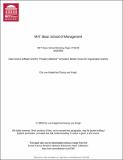| dc.contributor.author | von Hippel, Eric A. | |
| dc.contributor.author | von Krogh, Georg | |
| dc.date.accessioned | 2011-09-30T17:09:32Z | |
| dc.date.available | 2011-09-30T17:09:32Z | |
| dc.date.issued | 2009-04-30 | |
| dc.identifier.uri | http://hdl.handle.net/1721.1/66145 | |
| dc.description.abstract | Currently two models of innovation are prevalent in organization science. The "private investment"
model assumes returns to the innovator results from private goods and efficient regimes of
intellectual property protection. The "collective action" model assumes that under conditions of
market failure, innovators collaborate in order to produce a public good. The phenomenon of open
source software development shows that users program to solve their own as well as shared technical
problems, and freely reveal their innovations without appropriating private returns from selling the
software. In this paper we propose that open source software development is an exemplar of a
compound model of innovation that contains elements of both the private investment and the
collective action models. We describe a new set of research questions this model raises for scholars in
organization science. We offer some details regarding the types of data available for open source
projects in order to ease access for researchers who are unfamiliar with these, and also | en_US |
| dc.language.iso | en_US | en_US |
| dc.publisher | Cambridge, MA; Alfred P. Sloan School of Management, Massachusetts Institute of Technology | en_US |
| dc.relation.ispartofseries | MIT Sloan School of Management Working Paper;4739-09 | |
| dc.subject | collective action | en_US |
| dc.subject | open source software | en_US |
| dc.subject | innovation | en_US |
| dc.subject | incentives | en_US |
| dc.title | Open Source Software and the “Private-Collective” Innovation Model: Issues for Organization Science | en_US |
| dc.type | Working Paper | en_US |
